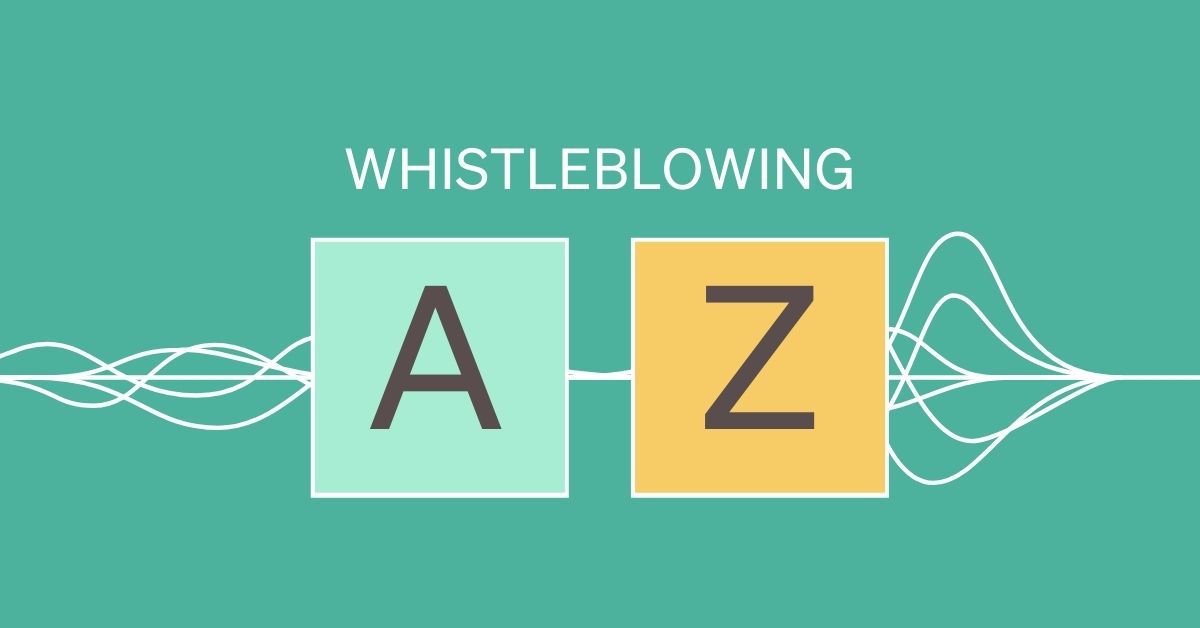
How to get compliant with the Italian Whistleblowing Law
Fraud, corruption, business ethics, and even hotlines, just some of the words we hear when discussing the subject of whistleblowing and whistleblowing systems. But what do they all mean?
Find out in this glossary which addresses the most common terms and practices associated with whistleblowing.
This is part one of our glossary, you can read part two here.
Anonymous reporting
Disclosing information about wrongdoing via a secure reporting channel, without having to provide personal information, not even to the person handling the report, is anonymous reporting.
Bribery
When someone or an organisation offers money, a gift, service or other similar benefit to another person, to persuade them to do something in their favour. A bribe can be unlawful or unethical.
Also known as corporate ethics, are about what is morally right, wrong, and appropriate in the workplace. Business ethics are based on core values and standards that set the conduct for guiding decisions and actions. A breach of these ethics could be a whistleblowing matter.
These are guidelines for how an organisation conducts its business, in an ethically, socially, and environmentally responsible way. The code can be developed by the company itself or created by an industry association.
Compliance
In a business sense, compliance means meeting the rules, standards or policies set out by the company or the law. For instance, it’s a requirement for all organisations in the EU, with over 50 employees, to comply with the requirements of the EU Whistleblowing Directive – see below.
Confidentiality is keeping sensitive data private unless the owner of the information gives consent for it be shared. Confidential reporting is when someone makes a whistleblowing report with the understanding that their identity will not be disclosed beyond those authorised to know it, or where legally necessary.
Conflict of Interest
This occurs when a person or an entity faces choosing between their own personal interests and that of their professional duties or responsibilities.
Corporate governance
This refers to how a company is directed and controlled through a system of rules, practices, and processes. If breached, it could be reported on through a whistleblowing channel.
Corruption
Abuse of influence or position of power for personal gain. Giving or receiving a gift for the purpose of influencing a decision is corruption.
Data protection
Due to GDPR (see below), it’s necessary for organiastions to protect data they collect, store or use, which could identify a person or other sensitive information, in digital or physical form. Data protection is crucial when using a whistleblowing system because information provided by the whistleblower must be processed in accordance with the requirements of the law.
Discrimination
In the workplace, discrimination is when a person or group is treated negatively because of gender, age, ethnicity, disability, sexual orientation, religion, political opinions or other reason.
Encryption
Encryption is when information is converted into unreadable data (code), which can not be read by anyone other than the recipient. Using encryption is one way to ensure data protection.
EU Whistleblowing Directive
A Directive from the EU requiring all member states to transpose a whistleblowing law that protects individuals who report work-related misconduct. This requires organisations with over 50 employees to implement a reporting channel.
Learn more about The Directive’s impact on organisations.
External whistleblowing
This is when someone reports misconduct outside of an organisation. This may be to a government agency or the media via an external reporting channel. Whistleblowers may turn to external whistleblowing if they have tried to report internally but haven’t received a response, or they are afraid of retaliation, or the organisation doesn’t have a reporting channel.
Fraud
When someone intentionally misleads someone or systems, with the aim of gaining an unfair or illegal advantage. As fraud tends to be a violation of law, organisations are encouraged to have efficient reporting mechanisms in place to detect it.
GDPR
The General Data Protection Regulation (GDPR), is an EU data protection and privacy law that came into force on 25th May 2018. It regulates the use and handling of personal data within the Union. Organisation’s must take GDPR into account when handling whistleblowing reports.
Harassment
Defined as behaviour that violates someone’s dignity and is related to the grounds of discrimination, gender, identity, ethnicity, religion, disability, sexual orientation or age. It can be aimed at an individual or a group of individuals.
Would you like to learn more about a whistleblowing service and safe internal reporting channels? Read more about the EU Whistleblowing Directive here and at EUR-Lex.
Would you like to discuss a whistleblowing system for your organisation?
Please contact us to book a free demo of the Whistlelink platform!
Pokud máte nějaké komentáře k tomuto článku nebo se chcete dozvědět více o systému Whistlelink, rádi si vyslechneme váš názor.
Společnost Whistlelink si váží vašeho soukromí. Budeme vás kontaktovat pouze ohledně našich řešení.Z odběru se můžete kdykoli odhlásit. Další informace naleznete v našich Zásadách ochrany osobních údajů.


Nice to meet you!

VI TRÄFFAR DIG GÄRNA

Piacere di conoscervi

Z PRZYJEMNOŚCIĄ SPOTKAMY SIĘ Z TOBĄ


NE BUCURĂM DE CUNOȘTINȚĂ

ENCATADOS DE CONOCERTE

WIR FREUEN UNS AUF SIE!

ENCHANTÉ DE VOUS CONNAÎTRE !

TĚŠÍ NÁS, ŽE VÁS POTKÁVÁME
Vaše soukromí je pro nás důležité. Budeme vás kontaktovat pouze v případě, že se to týká našich řešení.
Předplatné můžete kdykoli zrušit. Další informace naleznete v našich Zásadách ochrany osobních údajů.

HAPPY TO MEET YOU!
Whistlelink values your privacy. We will only contact you about our solutions.
You may unsubscribe at any time. For more info, please review our Privacy Policy
